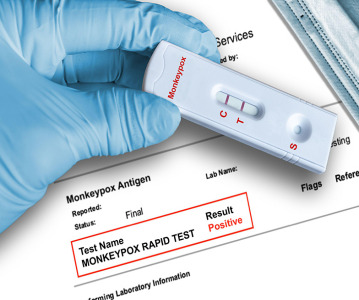NIH-Funded Research Suggests Novel Approach for Developing Drugs for Inherited Alzheimer’s

Mutations in the presenilin-1 gene are the most common cause of inherited, early-onset forms of Alzheimer’s disease. In a new study, published in Neuron, scientists replaced the normal mouse presenilin-1 gene with Alzheimer’s-causing forms of the human gene to discover how these genetic changes may lead to the disorder. Their surprising results may transform the way scientists design drugs that target these mutations to treat inherited or familial Alzheimer’s, a rare form of the disease that affects approximately 1% of people with the disorder. The study was partially funded by the National Institute of Neurological Disorders and Stroke (NINDS), part of the National Institutes of Health.
For decades, it has been unclear exactly how the presenilin mutations cause Alzheimer’s disease. Presenilin is a component of an important enzyme, gamma secretase, which cuts up amyloid precursor protein into two protein fragments, Abeta40 and Abeta42. Abeta42 is found in plaques, the abnormal accumulations of protein in the brain which are a hallmark of Alzheimer’s. Numerous studies suggested that presenilin-1 mutations increased activity of gamma-secretase. Investigators have developed drugs that block gamma-secretase, but they have so far failed in clinical trials to halt the disease.
The study led by Raymond Kelleher and Jie Shen, professors of neurology at Harvard Medical School, Boston, provides a plot twist in the association of presenilin-1 mutations and inherited Alzheimer’s disease. Using mice with altered forms of the presenilin gene, Drs. Kelleher and Shen discovered that the mutations may cause the disease by decreasing, rather than increasing, the activity of gamma-secretase.
One of the presenilin mutations also caused impairment of memory circuits in the mouse brain and age-dependent death of neurons.
“The findings by Drs. Shen and Kelleher are a significant departure from conventional thinking that should open up exciting and creative new possibilities at all levels of research, from basic molecular mechanisms all the way to clinical intervention,” said Roderick Corriveau, programme director at NINDS.
“This is a very striking example where we have mutations that inactivate gamma-secretase function and yet they trigger an array of features that resemble Alzheimer’s disease, notably synaptic and cognitive deficits as well as neurodegeneration,” said Dr Kelleher.
“This study is the first example of a mouse model in which a familial Alzheimer’s mutation is sufficient to cause neurodegeneration. The new model provides an opportunity that we hope will help with the development of therapies focusing on the devastating neurodegenerative changes that occur in the disease,” Dr Kelleher said.
The results in this paper suggest a new approach for drug development. “We believe that restoring gamma-secretase would be a better, more effective therapeutic strategy for Alzheimer’s patients,” said Dr Shen.
Related News
-
News CPHI Frankfurt 2022: Innovator Interview – DSM Biomedical
At CPHI Frankfurt we spoke to Anne-Cecile Bayne, Global Science & Innovation Lead Pharma and Medical Nutrition, and Marc Hendriks, Vice President Strategy & Business Development, on their expertise in nitrosamines and business strategy at DSM Biomedica... -
News New WHO health emergency guidelines expect full transparency from Big Pharma
The WHO are proposing a new set of pandemic guidelines to set out how future global health crises should be handled. -
News Magic mushrooms could be used to treat mental health conditions
A compound found in magic mushrooms, psilocybin, could be used to treat mental health conditions and help patients suffering with severe depression, as shown by the results of the largest study of its kind to date. -
News UK-based partnership to launch DETERMINE study into rare cancer research
UK-based CRO Quanticate is set to partner with Cancer Research UK for the launch of the DETERMINE study focused on testing a range of existing and approved drugs and therapies on rare cancers. -
News FDA approves Thermo Fisher blood tests for wheat and sesame allergies
Both tests have been approved by the US regulator for in vitro diagnostic use -
News QIAGEN launches world’s first syndromic test for monkeypox
The test can distinguish between monkeypox and other diseases that cause similar symptoms. -
News Monkeypox Update: Vaccine shortage, sewage surveillance and global testing
As concern over the monkeypox outbreak continues to rise, we take a look at major developments from the first week of August. -
News CPHI Podcast Series: The importance of novel excipients for innovative drug development
The latest episode in the CPHI Podcast Series dives into the world of novel excipients and explores their importance for innovative drug development.
Position your company at the heart of the global Pharma industry with a CPHI Online membership
-
Your products and solutions visible to thousands of visitors within the largest Pharma marketplace
-
Generate high-quality, engaged leads for your business, all year round
-
Promote your business as the industry’s thought-leader by hosting your reports, brochures and videos within your profile
-
Your company’s profile boosted at all participating CPHI events
-
An easy-to-use platform with a detailed dashboard showing your leads and performance


.png)




